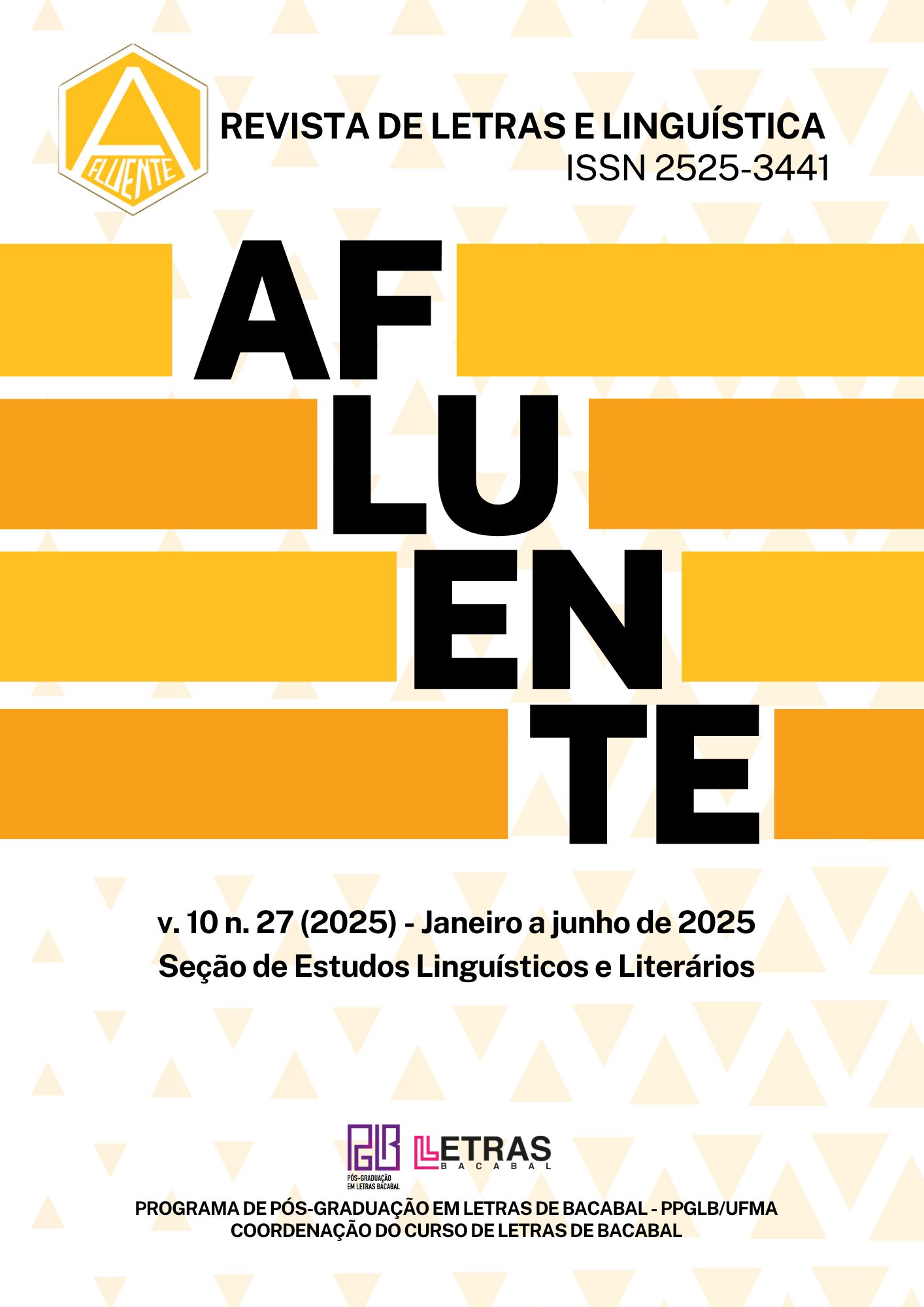A language experience in O Irmão Alemão, by Chico Buarque
DOI:
https://doi.org/10.18764/2525-3441v10n27.2025.02Keywords:
The German brother, historicity of language, primary sourceAbstract
The novel The German Brother, by Chico Buarque, starts from a primary source (letter), found by one of the characters, which moves the development of the narrative and highlights the uniqueness of primary sources for contemporary History and Literary Theory. Published in 2014, the novel highlights a global scenario, with fragmented territorial borders, structured between the tensions of what is real/historical – intertwined in a fertile web of imagination – establishing a fictional field. Therefore, this study aimed to propose a semiotic reading of the novel, emphasizing experience as a cognitive aspect of language whose materiality makes it possible to visualize the subjective of human relations, and the conflicts of the globalized, transnationalized territory. He followed the qualitative research method, performing a reading of some of his excerpts, focusing on the textual surface, that is, on language, based on Benveniste (1989) and Lacan (1982; 1998) among others; as well as Aira (1993), which made it possible to understand the fictional element as an aid to thought, and exoticism in its critical and positive aspect. To this end, Schøllhammer (2021) promoted the understanding of exoticism as a literary element of language. Santos (1998) and Bhabha (1998) helped in the reflection on the transnationalized space/territory and discursive instance. Thus, he found, in The German Brother, a narrative sustained by the historical bias of a primary source, although the reader finds semiotic stimuli to transit through the boundaries of the real and the imagination, where the fictional is established illuminating fragmented Brazilian-German spaces, which reflect a globalized context in which Nazi and dictatorial ideologies echo in the materiality of language.
Downloads
References
AIRA, C. “Exotismo”. Boletín del Centro de Estudios de Teoría y Crítica Literaria, Universidad Nacional de Rosario, n. 3, 1993, p. 73-79.
BACHELARD, G. A poética do devaneio. Trad: Antônio de Pádua Danesi. São Paulo: Martins Fontes, 1988, p. 1-27.
BENVENISTE, É. O aparelho formal da enunciação. In: Problemas de Linguística Geral II. 3 ed. São Paulo: Pontes, 1989.
BHABHA, Homi K. O local da cultura. Belo Horizonte: Editora UFMG, 1998.
DUPLA, S. A. Quando os deuses copulavam: a sexualidade da deusa Inanna no Antigo Oriente Próximo. Temporalidades – Revista de História, Pampulha: Belo Horizonte/MG, ed. 21, v. 8, p. 483-496, 2016.
HOLANDA, C. B. O irmão alemão. São Paulo: Companhia das Letras, 2014.
LACAN, J. Escritos I. Trad. Vera Ribeiro. Rio de Janeiro: Jorge Zahar Editor, 1998.
LACAN, J. O seminário: livro 20, mais, ainda. Trad. M.D. Magno. Rio de Janeiro: Jorge Zahar Editor, 1982.
MINEIRO, M. A.; ARAÚJO, M. M. M. Relações intertextuais entre Literatura e História: O Irmão Alemão de Chico Buarque. Revista Mediação, Pires do Rio/GO, v. 12, n. 1, p. 83-94, 2017. Disponível em: https://www.revista.ueg.br/index.php/mediacao/article/view/6318/4473. Acesso: 28 jan. 2023.
OLIVEIRA, L. F.; RODRIGUES, L. P. Aula de leitura: da materialidade semiótica do texto a imaginação simbólica. Revista Caletroscópio, Ouro Preto/MG, v. 9, n. 2, p. 254-277, 2021. Disponível em: https://periodicos.ufop.br/caletroscopio/article/view/4913/3912. Acesso: 7 fev. 2023.
OLIVEIRA, L. F.; RODRIGUES, L. P. Leitura: um lugar atravessado pela historicidade da linguagem. Revista do GELNE, Natal/RN, v. 22, n. 2, p. 202–214, 2020. Disponível em: https://periodicos.ufrn.br/gelne/article/view/19725. Acesso: 24 jan. 2023.
SANTOS, M. O retorno do território. In: SANTOS, M. et al. (org.). Território, Globalização e fragmentação. Associação Nacional de Pós-Graduação em Pesquisa de Planejamento Urbano e Regional. 4. ed. São Paulo: Editora HUCITEC, 1998.
SCHØLLHAMMER, K. E. Escrever a diferença: o exotismo segundo César Aira. Revista ALEA, Rio de Janeiro, vol. 23/3, p. 178-189, 2021. Disponível em: https://www.scielo.br/j/alea/a/PxfCFX4hY56BxmHK7fCgCQf/?lang=pt&format=pdf. Acesso: 28 jan. 2023.
ZILBERMAN, R. et. al. As pedras e o arco: fontes primárias, teoria e história da literatura. Belo Horizonte: Editora UFMG, 2004.
Downloads
Published
How to Cite
Issue
Section
License
Copyright (c) 2025 Afluente: Revista de Letras e Linguística

This work is licensed under a Creative Commons Attribution 4.0 International License.
Direitos autorais Afluente: Revista Eletrônica de Letras e Linguística
Este trabalho está licenciado com uma Licença Creative Commons - Atribuição 4.0 Internacional.














